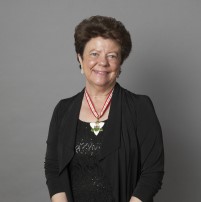Monica Elaine Campbell
Co-leader, Ottawa Deaf Palliative Care Team
Palliative Care Multidisciplinary – Class of 2005
Monica Elaine Campbell was contacted one day by a hospital that called her to help the staff with her lip-reading skills. A dying patient had lost her voice box to cancer and was communicating with her family using pen and paper. But she had become so weak, she could no longer write. Would Campbell, who was born deaf and had become a capable lip-reader, be willing to use her skills to interpret this woman’s last thoughts?
Over the next few hours, Campbell relayed about 85 per cent of what the woman wanted to say to her family. When she left the hospital, she says she wasn’t the same person as she’d been when she arrived. She kept thinking, “What if that was me in that situation, or another deaf person, or a deafblind person, would there be someone there for me or them?” She contacted a group of Deaf friends, and they got together to talk about their personal experiences with death and dying. Together they concluded it would be a huge benefit if Deaf people volunteered to work with other members of their community during end-of-life care.
(Deaf people make a distinction between the Deaf, a sub-culture of people whose language is sign language; the hard of hearing, whose hearing loss ranges from mild to severe but can still use speech; and the deafened or oral deaf, who have lost some or all of their hearing but learned to speak before or despite their deafness.)
It was the start of Campbell’s selfless work to provide palliative care for the Deaf and for the rights of Deaf people to access interpretative services, especially at the end of their lives. For her dedication to the community, she was awarded the Order of Ontario in 2016. She has also earned the June Callwood Award, the Rehabilitation Centre Achievement Award (The Ottawa Hospital), the Canadian Council of Disabilities Award and other honours.
Campbell was born in Prince Edward Island and diagnosed as being profoundly deaf at 15 months. Her parents, whom she adored, were determined that she learn to speak and lip-read. They were instrumental in the establishment of an oral school for deaf children that could serve her and others like her in the community. She spent nine years at the school before entering the public system in Grade 10 when she was 14.
“It was hard keeping up with the hearing world,” she says, and a test of her skills and resilience. But she persevered and continued her studies at the University of Prince Edward Island, where she thrived and graduated with an honours degree in mathematics.
Campbell began her career with the provincial government, then joined the federal civil service. After a few years she applied for a transfer to Ottawa, where she could access more support services for the deaf. In the 1990s, she took American Sign Language (ASL) courses for the first time. The classes brought her into greater contact with culturally Deaf people and a new world opened up to her. “One day, when I completed Level 4 sign language, it just hit me that I no longer felt like a broken person who needed to be fixed. I’m a human being who happens to be deaf and my communication needs vary depending on the situation I’m in.”
Helping other Deaf people with their communication needs at the end of life became her life’s goal. She continued her ASL studies and joined a spiritual care team, the St Rene Goupil Catholic Ministry, visiting ailing members of the Deaf community. She entered the Palliative Care Multidisciplinary Program at Algonquin College and graduated in 2005. While working toward her accreditation, she and two friends formed a committee that ultimate would lead the Glebe Centre to establish a dedicated floor for Deaf seniors.
She took additional training from the May Court Hospice and worked with other associates in the 2000s to create the volunteer Deaf Palliative Care Team, now known as the Ottawa Deaf Health Care Team. She was the representative of the Canadian Association of the Deaf on the Quality End-of-Life Care Coalition of Canada for four years, spent two years working with Health Canada’s Secretariat on Palliative and End-of-Life Care and participated in the Canadian Partnership Against Cancer for three years. As a tutor, Campbell worked with deaf and hearing students to advance their understanding of math and science. She volunteered at the Deaf Kitchen Club to teach Deaf women with low literacy skills how to prepare meals. Her advocacy for the needs and rights of Deaf people is tireless.
“My main hope at all times is that the Deaf have full access to the services they need,” she says. “People in hospitals, for instance, need to be aware that we have legal access to the services of professional, qualified interpretative services” — a goal Campbell continues to work toward alongside her many dedicated colleagues.
